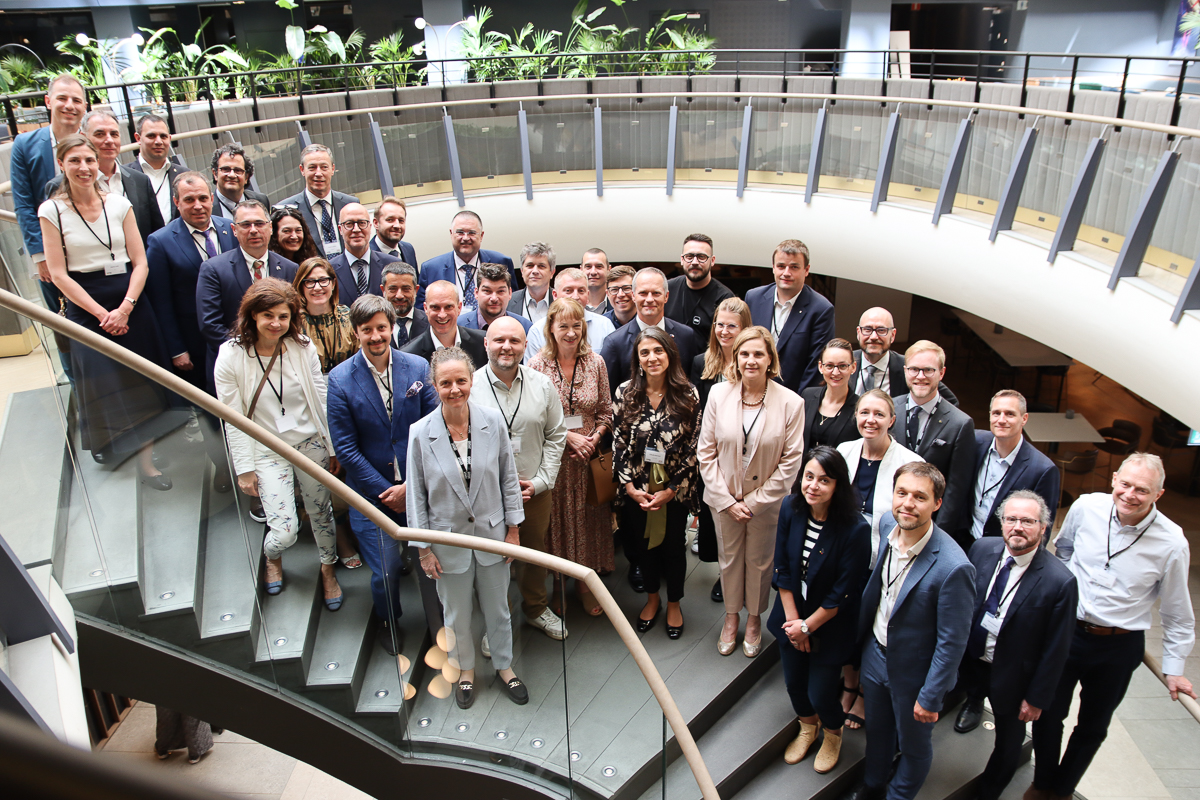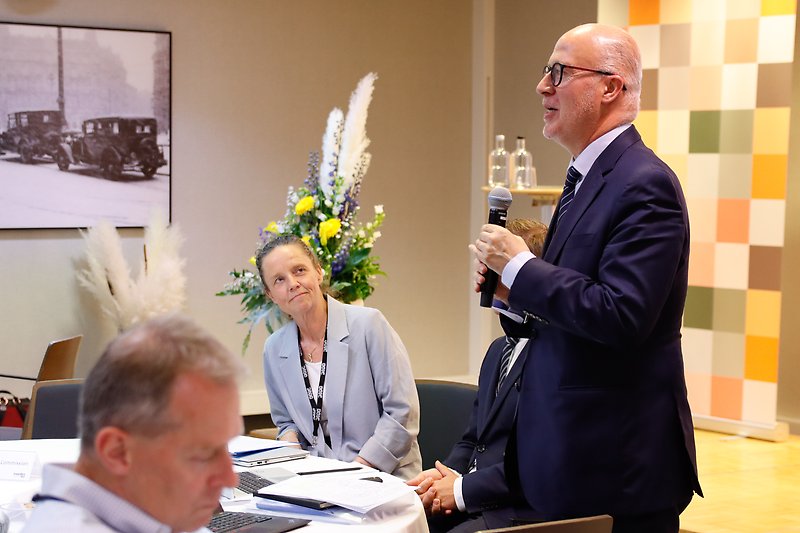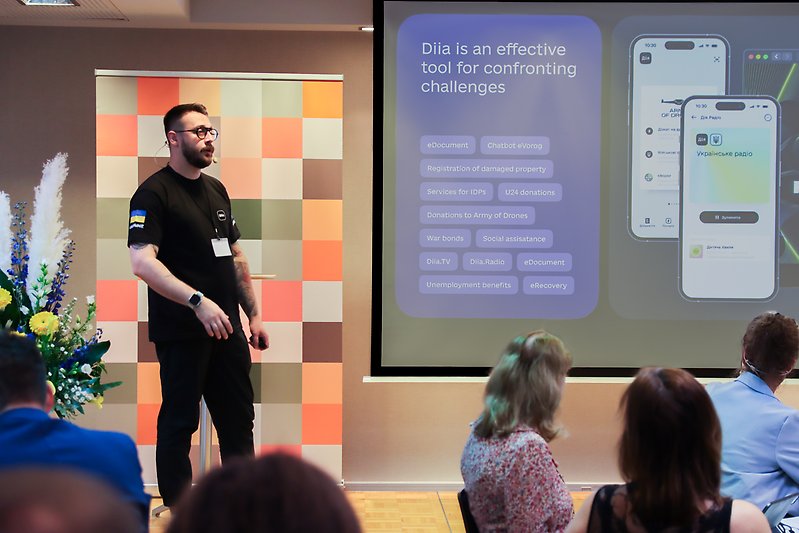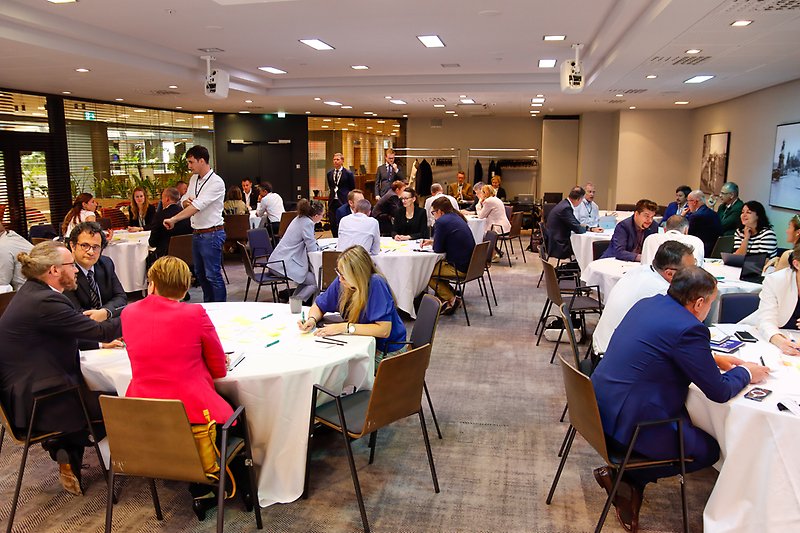"Take care of your people" – the rallying call of the EU CIO Network Meeting

“Take care of your people.” Those were the words that Slava Banik, Head of the Ukrainian Directorate for the Development of Electronic Services, chose to end his presentation at the EU Chief Information Officers’ Network Meeting, held in Stockholm on 14th June. Although those words have a special resonance when spoken by a Ukrainian, during the ongoing Russian invasion, they also echoed the mission of every attendee at the event: the importance of taking care of their citizens in an increasingly digital world.
The CIO Network Meeting is part of the work of the Council of the EU, one of the seven EU institutions. The Presidency of the Council, currently held by Sweden, rotates among the Member States every six months. The Council meet to discuss and coordinate policies and represent all 27 Member States in negotiations with the institutions. CIO Network meetings are organised by the relevant government agency dealing with digital matters – in this case Sweden’s Agency for Digital Government, Digg. One part of the day’s events was handing over leadership of the CIO Network to Spain, the next country to take on the Presidency of the Council.
What was clear, from both speakers and participants, was the sense of urgency, especially in the light of recent AI advances and uses.
“We need to run to keep up”, said Veronica Gaffey, Director-General of DIGIT, the European Commission department responsible for digital services, at one stage.
Anna Eriksson, Digg’s Director-General, agreed:
“We need to step up and do more to reach our goals.”

Anna Eriksson, Digg´s Director-General and Miguel A. Amuito, the Spanish Deputy for Cybersecurity Planning and Coordination.
Where the network comes into its own
Anna Eriksson opened the event, explaining the three guiding principles Digg had in mind when organizing it: transparency, continuity and informality. She felt that it was at these types of events that “the network really comes into its own, by sharing experiences and learning from each other”. She then introduced Slava Banik, stating that Ukraine’s “resilience is inspiring, and shows us the importance of Europe staying together”.

Slava Banik, Head of the Ukrainian Directorate for the Development of Electronic Services.
Slava Banik gave a presentation on his country’s use of digital tools, and how, since Russia’s aggression, digital has become the main way of delivering documents and services to citizens. Their digital service Diia, consist of a mobile app with 14 digital documents and 25 services for individuals and businesses, and a web portal, with more than 100 services. Over the past year it has become clear how digital literacy in the population has grown.
“Over 100,000 people have changed their address, and Diia is an effective tool for confronting these challenges.”
The Berlin Declaration and the Interoperable Europe Act Proposal
Following on, Veronica Gaffey spoke about the Interoperable Europe Act proposal, and how cross-border digital services could facilitate living, studying and working in other countries.
“We have a choice”, she said. “We can either develop services in silos, or in an integrated way. We won’t build Rome overnight, but it’s important to get some key elements right from the start. And it’s important to do this together.”
Anna Eriksson returned to the stage with Natalia Aristimuño Pérez, Digital Services Director at DIGIT, to present the report on the monitoring of the Berlin Declaration.
“This report isn’t just a document, it’s a guide actually”, said Anna Eriksson.
This was underlined by Natalia Aristimuño Pérez:
“This shouldn’t be read like a book, but have it at hand, use it to see if there are experiences there that you can learn from, if you have a service you want to try.”
Natalia Aristimuño Pérez highlighted some examples from the report of what different countries had tried, such as Austria’s Council on Robotics and Artificial Intelligence and Denmark’s Ethics Council.
Turning principles into action
Round table discussions followed, with participants discussing key take-aways from the Berlin Declaration and its future, particularly in respect to fundamental rights and democratic values, empowerment and digital literacy, and human-centred systems in the public sector.
How realistic is it to achieve 100 percent of citizens using digital services? Should more services be available on mobile devices? There was also talk of more transactional services. Recurring themes were re-use, and learning from one another.
Stéphanie Schaer, Interministerial Digital Director from France, spoke about how France had the ambition to have a collaborative suite for all their civil servants.
“I would be happy to know more about the countries that also have this reflection.”
Again, the sense of urgency shone through, the urge to collaborate.

Round table discussions among the participants at the CIO Meeting.
The chance to talk
There were many animated discussions over lunch, where participants really grasped the opportunity to talk to their peers about shared problems and shared solutions. It was obvious that this was a part of the day that was enormously important for knowledge sharing and building relationships that could reap rewards in the future.
Sometimes at these types of events you see that people use lunch as an opportunity to scroll through their phone, or take a walk around the block. Not here. You could see that people were truly engaged with each other and their topics, not even the promise of traditional Swedish fika back in the main meeting room was enough to cut short their lunchtime conversations.
Lessons learned, lessons shared
After lunch there were three parallel sessions where participants had a chance to listen to presentations on relevant topics and then discuss in depth and report back.
Claudia Barroso, Portuguese Head of Unit, spoke about how her group had discussed the Data Atlas, and the use of Digital Academies, while Antonios Stasis, Director-General of Digital Governance from Greece, said that “we realised that we have common problems and we want common solutions” and that there were “great opportunities for public administration”.
Luukas Ilves, Estonian Deputy Secretary for Digital Transformation, made the point that in the past government bodies had been a long way behind the private sector, and he didn’t want that to be repeated, particularly in regard to minority and disabled groups. “What comes next? Maybe other forms of messaging will be much better for inclusion than mobile is”.
Leaving nobody behind as we step into the future
Following the feedback from the parallel sessions, Miguel A. Amuito, the Spanish Deputy for Cybersecurity Planning and Coordination spoke about Spain’s upcoming Presidency of the Council and leadership of the CIO Network. Miguel A. Amuito mentioned that he had been at the very first meeting of the Network and he was so pleased to be here in person for the current meeting, after previous COVID restrictions. Due to the upcoming Spanish general election it was not possible to commit to dates and to communicate their priorities, but he assured everyone how hard they were working in the background to put things in place.
Anna Eriksson closed the meeting by reiterating that the Berlin Declaration was about value-based digitalisation, and how at various discussions today she had heard the phrase “leave no one behind” used, which was extremely important. She mentioned how the Corona passports were a very good example of how by collaborating real problems could be solved, but that we needed to keep working together to move things forward even without the spur of crises.
Speaking after the event, Anna Eriksson said that she was very happy with the way the day had gone.
“We have been discussing very concrete things, and that is great. And we have really been sharing. We need to re-use what we do in other countries much more than we do today. I am looking forward to continuing some of the important discussions we have had here during the Spanish Presidency.”
Ten reflections on the day, the work of the Network and a digital future:
Ukrainian people are very proud of the way we have started to use digital tools for state services. They love it. People are really motivated to help teach their parents, their grandparents, to use these services.
Slava Banik, Head of the Directorate for
the Development of Electronic Services, Ukraine
We aren’t going to achieve cross-border interoperability unless we build systems that deliver outputs. It’s about a value proposition.
Barry Lowry, Chief Information Officer and Head of Operations, Department of Public Expenditure and Reform, Ireland
It’s important that we share information a little more. I’m aware that countries are all talking about open source products and cloud infrastructure, and I would like to see a more formal structure, to help with closer cooperation.
Markus Richter, State Secretary of Germany
We, as a small country, are most interested in hearing new ideas. It’s difficult to create something new from scratch, so we are enjoying hearing from countries with greater capacity.
Nikola Modrusan, Deputy Secretary of State at Central state office for developing of digital Society, Croatia
There is a lack of marketing skills in the public sector. We build something, we put it online, but we forget to explain and to promote it.
Frank Leyman, Head of International Relations, Digital Transformation Office, Belgium
We are all using so many different systems. If we want interoperability it has to come from the European level. We need a strong strategic vision.
Gérard Soisson, Coordinator for eInvoicing,
EU Single Digital Gateway, Interoperability, Ministry for Digitalisation, Luxembourg
The best thing about today has been the exchange on a personal level. With digitalisation everything we are working with is so fresh and new, there is no blueprint or draft to follow, which is why this exchange at a personal level is so important.
Maria Ulmer, Director-General of Digitalisation
and eGovernment, Federal Ministry, Austria
I like the way Sweden has organised the meeting. Today is all about learning from each other, and the brainstorming and sharing of ideas is really important. What is especially important now is to take the policy areas of the Berlin Declaration and turn them into real activities.
Luukas Ilves, Deputy Secretary for Digital Transformation, Estonia
Today is my first time at a CIO Network meeting, and it has been very interesting, and I am taking a lot of notes to take back to my country. For my country the most important policy area of the Berlin Declaration is digital empowerment and digital literacy.
Andriana Achilleos, Director at Department
of Information Technology Services, Cyprus
These CIO meetings are a real exchange of experiences, even the bad ones. It’s great we can meet and talk about real problems, and sometimes find that other people have the same problems, which we didn’t expect.
Ondřej Profant, Deputy Minister for Digitalization
and Regional Development, Czechia
Publicerad: